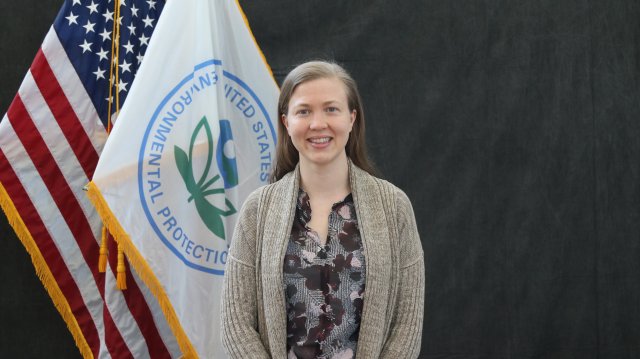Meet EPA Researcher Karoline Barkjohn, Ph.D.

EPA researcher Karoline Barkjohn works on understanding and improving data from lower cost air sensors. She is working on several exciting projects, including analyzing data from air sensors across the U.S. to better understand their performance and limitations; working with contractors to develop open-source tools making air sensor data analysis more accessible for those without strong coding backgrounds; providing scientific support to the AirNow Fire and Smoke map team to provide the public with reliable air sensor data on government webpages; planning a workshop to bring together experts to understand how to take air sensor data and turn it into community impacts, through reductions in air pollution or exposure; and communicating research results through presentations, papers, and websites.
Tell us about your background.
I went to North Carolina State University for my B.S. in environmental engineering. After my second year I interned at EPA working on air research. This sparked my interest in air quality and exposed me to the possibility of continuing to graduate school to learn more and hopefully return to lead my own air quality research. I went on to earn my M.S. in environmental engineering at Georgia Institute of Technology and my Ph.D. in environmental engineering at Duke University. My Ph.D. research focused on using air sensors to understand the impacts of portable air cleaners on asthmatic children’s exposure in China. I spent 6 months in China, and the air quality was often worse than I had ever seen it at home in North Carolina. However, my Chinese colleagues told me it was great since it was so much better than their hometowns. I did not think this work would be very relevant to a career at EPA, but it turns out air pollution can also be extreme during wildfires.
When did you first know you wanted to work in environmental science?
I was always passionate about environmental issues, but I never considered it as a career until later in high school. I took an introduction to engineering class and learned about environmental engineering. Solving environmental problems seemed like the perfect fit for me.
What do you like most about your job?
I like getting to answer real-world problems brought to us by our partners. Whether it’s a state or local agency staff person, a sensor manufacturer, a concerned parent, or someone else. Many people ask some version of, “I have this data, how do I make it more accurate so that we can use it to protect public health?” I love digging into interesting questions, whether by analyzing data or by reading research done by other groups. I also like working with so many different environmental science experts.
How does your science matter?
My science matters because having accurate air quality data is the first step to understanding how to improve air pollution and reduce exposure. Having more, lower cost air sensor measurements can help people track and understand air quality even if they are far from government monitors, or in their own home. Air quality data can help people take action to protect health, whether individuals closing their windows and running an air cleaner or governments working to control pollution sources.
If you weren’t a scientist, what would you be doing?
I would be an elementary school teacher. I think many of the skills between scientists and teachers are similar. When you try something, and it does not work just try again and if someone does not understand what you are explaining, try saying it again in a different way. Also, I love the curiosity of students.
What advice would you give a student interested in a career in science or engineering?
Talk to lots of people who have jobs in science and engineering. Find out what their day to day looks like and whether that sounds interesting to you. Think about what topics you are most passionate and interested in and your career will not feel so much like work. When you are in high school take lots of science and math classes. When you are in college and/or graduate school stick with it through all the boring required classes so you can make it to the career of your dreams.
If you can have any superpower, what would you choose?
I would love to be able to fly. Not only would it be so much fun but think about the reduced air pollution emissions from not needing to drive or fly in an airplane.
You are stranded on a desert island; how do you use science to survive?
In grad school I was a guest lecturer in a civil and environmental course on surviving the zombie apocalypse. We taught about air quality and face mask design (this was more fun since it was before the 2020 pandemic). I am less prepared to be stranded on a desert island.
What do you think is our biggest scientific challenge in the next 20/50/100 years?
How to reduce the impacts of climate change.
Editor's Note: The opinions expressed herein are those of the researcher alone. EPA does not endorse the opinions or positions expressed.
